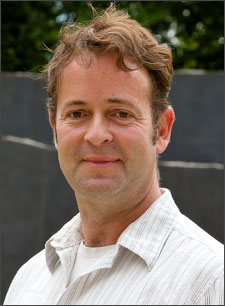FNU grants to Biophysics and Oceanography
Two professors at the Niels Bohr Institute, Mogens Høgh Jensen, Professor of Biophysics, and Markus Jochum, Professor of Oceanography, have both received a grant of 2.4 million kroner from FNU, Danish Council for Independent Research | Natural Sciences under the Ministry of Higher Education and Science.

Mogens Høgh Jensen, Professor of Biophysics has received a grant of 2.4 million kroner from FNU
Mogens Høgh Jensen, Professor of Biophysics has received a grant of 2.4 million kroner from the Danish Council for Independent Research | Natural Science, FNU for the research project: Synchronization of Oscillators and Traveling Waves in Flies and Embryos.
The project uses physical and mathematical modelling to describe fundamental phenomena in biology. The research will focus on situations where biological oscillations are important for the individual organism and the research group at the Niels Bohr Institute will work closely with two experimental biological groups in Bangalore, India and Heidelberg, Germany.
“In the first case, we will study how the movements of the large wings on the Black Soldier fly connect to the small wings on its back. In the second case, we will study how fluctuations in the amount of protein density in a chicken embryo have a decisive influence on the formation of the spine. In both cases, we will concentrate on situations where two independent oscillators are connected to each other, that is when they synchronize,” explains Mogens Høgh Jensen.
The grant is for three years and a PhD student will be appointed who will collaborate with Sandeep Krishna, National Center for Biological Science in Bangalore, India, where the experiments and some of the calculations will be carried out. This PhD student will have to travel to Bangalore several times during the project.

Markus Jochum, Professor of Oceanography at the Niels Bohr Institute has received a grant of 2.4 million kroner from the Danish Council for Independent Research | Natural Science, FNU
Markus Jochum, Professor of Oceanography at the Niels Bohr Institute has received a grant of 2.4 million kroner from the Danish Council for Independent Research | Natural Science, FNU for the research project: Glacial - Interglacial Carbon Cycle: the equatorial hypothesis.
Over the last 800,000 years, the Earth’s climate went through several periods of glacial and interglacial periods and these climatic shifts are connected to changes in the Earth’s orbit around the Sun and associated changes in the solar radiation. Changes in the volume of ice on the global level, the temperature and the concentration of carbon dioxide in the atmosphere are strongly intertwined. The connection between temperature and ice volume is not surprising and both are probably related to changes in the Earth’s orbit. The extent of variations in carbon dioxide, however, is still not understood.
“In this project, I want to establish a paleo-climate group with the ultimate goal of understanding the last 800,000 years of observed variations in temperature, carbon dioxide and the amount of land ice. I will especially focus on my own hypothesis for the observed observations of carbon dioxide, that is to say, that changes in the Earth’s orbit change the turbulence in the oceans around the equator, which leads to different ratios of nutrients and thus a different degassing of carbon dioxide in the zones around the equator, where nutrient rich water rises from the sea floor. This changes the concentration of carbon dioxide in the atmosphere,” explains Markus Jochum.
The grant is for three years and will primarily go for the hiring of a PhD student.
